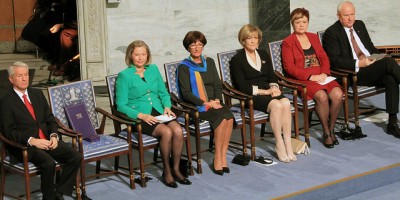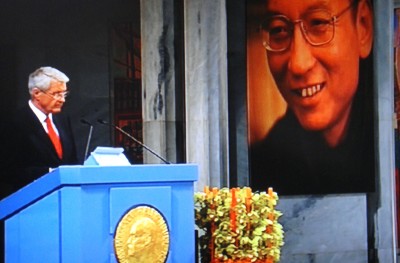As the Norwegian Nobel Committee starts meeting in Oslo for the first time this year, pressure is growing on both committee members and the system by which they’re chosen. They’re trying to remain immune from the rumbling, both over their selection process and their Nobel Peace Prize choices.

The leader of the Norwegian Nobel Committee, Thorbjørn Jagland, is standing firm in his belief that the committee is “important” and “autonomous” in a world that’s increasingly “being overtaken by commercial and geostrategic interests,” as he wrote in a commentary in newspaper Aftenposten over the weekend.
Jagland himself has been a target of criticism in his short tenure as committee leader, first over its choice of US President Barack Obama in 2009 and also because some critics think the committee has for years strayed from the intentions of benefactor Alfred Nobel’s will.
Calls have gone out lately for a more international composition of the committee, both to represent thinking in other parts of the world than Scandinavia and to further distance the committee from Norway politically. The current committee is appointed by the Norwegian Parliament, in line with Nobel’s will, and traditionally has been comprised of former Norwegian politicians to reflect party representation in Parliament at any given time.

The committee operates entirely independently of the Parliament and the Norwegian government, but those offended or angered by prize choices have failed to distinguish the committee from the “official Norway.” Chinese officials, most recently, were furious that last year’s prize was awarded to one of their leading critics, Liu Xiaobo, and they’ve been snubbing Norway ever since. All political contact has been broken and official meetings have been cancelled, as have cultural exchanges. Some Norwegian businesses also feel they’re being punished over the prize, with Det Norske Veritas (DNV) losing important licenses in China and other firms reporting difficulty with imports and exports or even obtaining visas.
Some Norwegian business leaders are joining DNV boss Henrik O Madsen in calling for their government to make some new initiatives towards the Chinese, something the Norwegian politicians have refused to do. Perhaps it’s become a matter of both sides trying to “save face,” but for the most part, the Norwegian government seems keen to simply ride out the storm. Madsen, who also advocates more foreign representation on the Nobel Committee, says that’s too passive, and he rejected criticism in newspaper Aftenposten over the weekend that he’s merely concerned about the bottom line. DNV, he responded, has “great respect for the Peace Prize and the committee’s independent work,” but it “can be seen as a political instrument for Norway. This can, in the long term, reduce the Peace Prize’s authority in an international arena.”
Lawyer Fredrik S Heffermehl, long a critic of the committee’s choices over the years, went so far as to call for the current members to resign. In a column in Aftenposten on Monday, Heffermehl suggested they don’t have the competence or will to meet Nobel’s goals for the Peace Prize. He thinks Nobel’s vision for peace centered on disarmament and anti-militarism, and is crumbling under successive committees.
Jagland disagrees with most of the criticism. The committee, he wrote over the weekend, “would be destroyed as an independent voice … from the minute it were to start handing out Peace Prizes for different parts of the world.” Opening the committee to members from around the world, he wrote, “would start a political battle in the Parliament over who and where they should come from.” There would be “dissatisfaction all over the world” if certain parts aren’t represented. The Nobel Committee, he said, “could become just as toothless as the UN Security Council.” (Jagland’s commentary in Aftenposten was published just before the Security Council made a unanimous decision that some are calling historic, to impose sanctions on Libyan leader Moammar Gadhafi.)
“The Nobel Committee has defended and carried on a long tradition as being the world’s conscience,” Jagland maintained. The committee is now beginning its evaluations for the next Nobel Peace Prize, to be announced in October and awarded in December.
Views and News from Norway/Nina Berglund
Join our Reader Response forum if you’d like to comment on this story. Reader response

